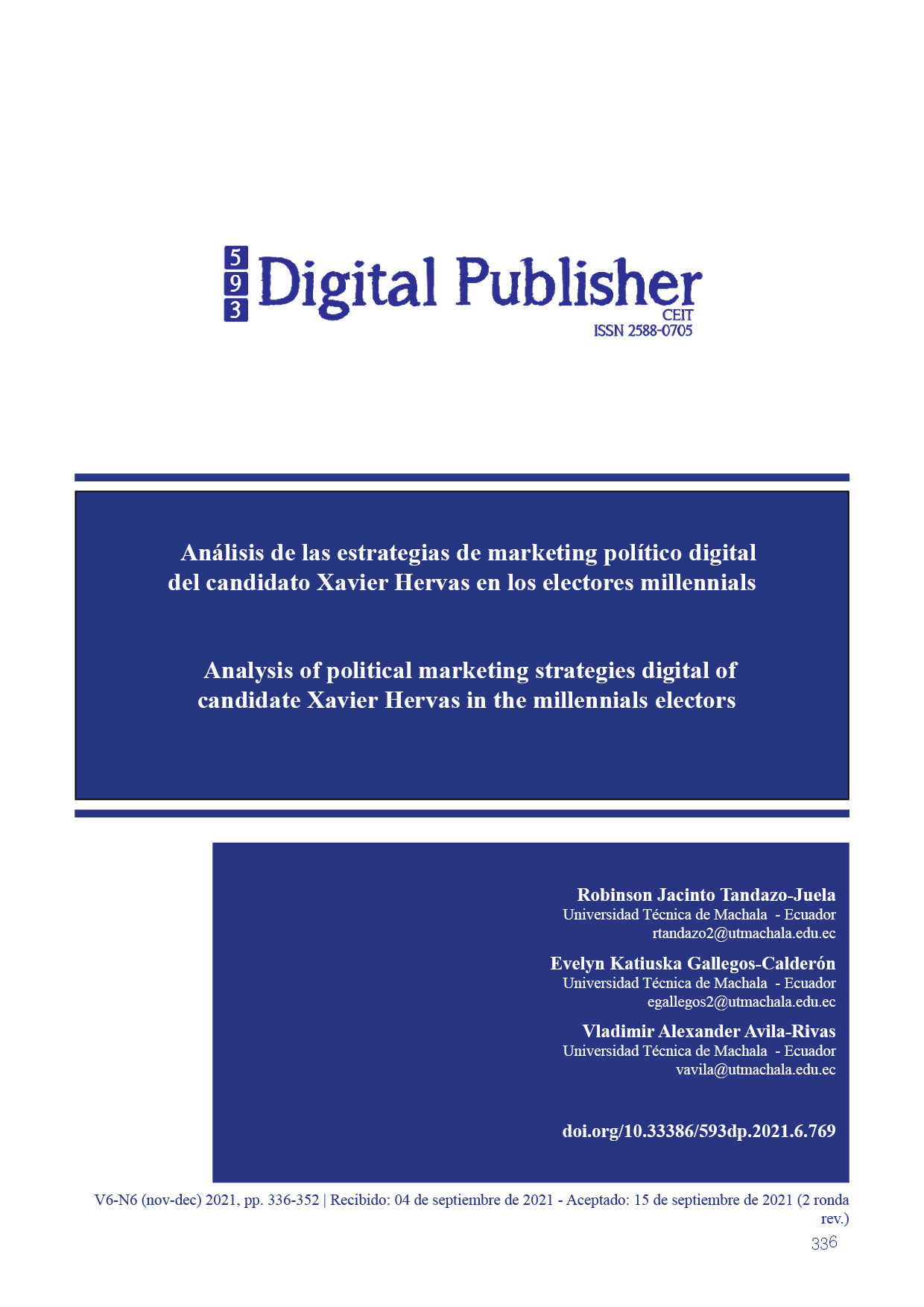Analysis of political marketing strategies digital of candidate Xavier Hervas in the millennials electors
Main Article Content
Abstract
The influence of the digital political marketing strategies applied by the candidate Xavier Hervas to the millennial voters in the digital media were reflected in the results of the presidential elections Ecuador 2021; the candidate obtained the fourth place with 15.68% of the votes. Therefore, the main objective of the research is to analyze the influence of digital political marketing strategies in electoral campaigns in favor of the candidate. The focus of the research is quali-quantitative, this is a flexible method that allows to collect, analyze and classify the information of the studied phenomenon, together with a descriptive and documentary modality, since it is intended to explain the influence of the strategies towards millennial voters. The collection of information was carried out through primary sources with the survey instrument for the respective analysis and secondary sources where the textual data will be validated. For the application of the instrument, a study sample of 384 people with ages ranging from 16 to 41 years was established in Ecuador, a segment that is immersed in the voting decision.
As a final result, the most important strategies of the candidate were determined: The candidate's participation was made known forcefully in digital media, the voters demonstrated a very positive acceptance, later a wide acceptance by the female public was identified, the strength of their The image is composed of his campaign proposals, viral trends and professional career, the most relevant themes in campaigns were employment, education and health, the perception of interest and confidence that he demonstrated within this process was positive, it is concluded that Facebook, TikTok and Instagram are the three preferred platforms and where it is recommended to work with innovative content if you want to generate excellent results.
Downloads
Article Details

This work is licensed under a Creative Commons Attribution-NonCommercial-ShareAlike 4.0 International License.
1. Derechos de autor
Las obras que se publican en 593 Digital Publisher CEIT están sujetas a los siguientes términos:
1.1. 593 Digital Publisher CEIT, conserva los derechos patrimoniales (copyright) de las obras publicadas, favorece y permite la reutilización de las mismas bajo la licencia Licencia Creative Commons 4.0 de Reconocimiento-NoComercial-CompartirIgual 4.0, por lo cual se pueden copiar, usar, difundir, transmitir y exponer públicamente, siempre que:
1.1.a. Se cite la autoría y fuente original de su publicación (revista, editorial, URL).
1.1.b. No se usen para fines comerciales u onerosos.
1.1.c. Se mencione la existencia y especificaciones de esta licencia de uso.
References
Pinedo, J., & Herrero, J. (2005). Pensamiento Estratégico, Teoría de Juegos y Comportamiento humano. Indivisa: Boletín de estudios e investigación, 37-68. Obtenido de https://dialnet.unirioja.es/servlet/articulo?codigo=1340897
Agarwal, M. H. (2007). Comunicación Política: Campañas digitales. Chasqui. Revista Latinoamericana de Comunicación. Obtenido de https://www.redalyc.org/pdf/160/16009807.pdf
Aseef Parraga, E., & Solano Aponte, K. (2021). Análisis del storytelling en las campañas electorales ecuador 2021 caso guillermo lasso. Repositorio Digital de la UTMACH, 14. Obtenido de http://repositorio.utmachala.edu.ec/handle/48000/17022
Aucatóma, B., Ballesteros, L., Albán, M., & Silva, I. (2019). Elementos de la estrategia de campaña de marketing político en la Provincia de Tungurahua. 593 Digital Publisher CEIT, 123-136. Obtenido de file:///C:/Users/USUARIO/Downloads/Dialnet-ElementosDeLaEstrategiaDeCampanaDeMarketingPolitic-7144036%20(2).pdf
Barranco Saiz, F. J. (2010). Marketing político y electoral. Madrid: Ediciones Pirámide. Obtenido de https://www.edicionespiramide.es/libro.php?id=2456276
Bunge, M. (1983). La investigación científica: su estrategia y su filosofía. Mexico: ARIEL. Obtenido de https://books.google.es/books?id=iDjRhR82JHYC&printsec=frontcover&hl=es#v=onepage&q&f=false
Comercio. (03 de febrero de 2019). Los mileniales corresponden al 44% del padrón electoral. Machala, El Oro, Ecuador. Obtenido de https://www.elcomercio.com/actualidad/mileniales-padron-electoral-jovenes-campana.html
Consejo Nacional Electoral. (21 de junio de 2006). Obtenido de https://cne.gob.ec/documents/Estadisticas/Atlas/CNE_ATLAS-ELECTORAL-DELECUADOR-2002-2007-29-71.pdf
Espinosa, C., & Moncagatta, P. (2019). No Country for the Right Wing? Actores, trayectoria, oferta y demanda de la derecha en Ecuador. Colombia Internacional , 121-150. Obtenido de https://www.redalyc.org/articulo.oa?id=81260251005
Hurtado, P. D., Cardona, A. T., Ramírez, D. R., & Henao, M. C. (2020). Marketing viral: Aplicación y tendencias. CLIO América, 454-468. Obtenido de https://dialnet.unirioja.es/servlet/articulo?codigo=7679474
INEC. (2021). Hablando de Millennials. Machala: Ecuador en cifras. Obtenido de https://www.ecuadorencifras.gob.ec/documentos/web-inec/Inforgrafias-INEC/2017/millenials.pdf
Jácome Santos, V. L., Dueñas Espinoza, F. X., & Mera Alvarez, M. V. (2015). Comunicación electoral: La transición de marketing a capital político. Revista San Gregorio, 22-31. Obtenido de https://dialnet.unirioja.es/servlet/articulo?codigo=5326956
Jordán, J., López, M., Soria, M., & Chasipanta, A. (2020). Factores integrales del marketing político. Análisis de redes sociales. 593 Digital Publisher CEIT, 180-189. Obtenido de https://dialnet.unirioja.es/servlet/articulo?codigo=7383243
Machado, D. (09 de febrero de 2021). Ecuador: Un nuevo ciclo politico. Lovaina la Nueva, Brabante Valón de Valonia, Bélgica. Obtenido de https://www.cetri.be/Ecuador-un-nuevo-ciclo-politico?lang=fr
Narváez, R. E., & Bartolomé, J. C. (2019). Estrategia de comunicación publicitaria emocional para el desarrollo de campañas ATL y BTL en el sector de Leonidas Plaza, Comercial Dulcemania y Arreglos “Sarita”. 3C Empresa. Investigación y pensamiento crítico, 73-93. Obtenido de https://dialnet.unirioja.es/servlet/articulo?codigo=7172933
Piñeiro-Otero, T., & Martínez-Rolán, X. (2020). Para comprender la política digital. Vivat Academia, 19-48. Obtenido de https://dialnet.unirioja.es/servlet/articulo?codigo=7576396
Pozo, E., & Abril, J. (2020). Estrategia de interactividad en la comunicación política con los electores como un factor del marketing político. 593 Digital Publisher CEIT, 40-53. Obtenido de https://dialnet.unirioja.es/servlet/articulo?codigo=7898230
Quiroz, N. T. (2020). TikTok. La aplicación favorita durante el aislamiento. Revista Argentina de Estudios de Juventud. Obtenido de https://perio.unlp.edu.ar/ojs/index.php/revistadejuventud
Ramos Méndez, D., & Ortega Mohedano, F. (2017). La revolución en los hábitos de uso y consumo de vídeo en teléfonos inteligentes entre usuarios Millenials, la encrucijada revelada. Revista Latina de Comunicación Social, 706-708. Obtenido de https://www.redalyc.org/pdf/819/81952828037.pdf
Rivera Costales , J. (2014). Rafael Correa y las elecciones 2006. Inicios del Marketing y Comunicación política digital en Ecuador. Chasqui, 120-121. Obtenido de https://revistachasqui.org/index.php/chasqui/article/view/271/271
Rocillo, L., & Moscoso, A. (2021). Marketing de contenido en la comunicación política de los candidatos presidenciales del Ecuador en Instagram 2021-2024. 593 Digital Publisher CEIT, 158-173. Obtenido de https://www.593dp.com/index.php/593_Digital_Publisher/article/view/559/676
Rodrìguez, J., Velàsquez, A., Abendaño, M., & Duque, V. (2018). Relación entre el uso de medios sociales de las universidades del Ecuador Vs. el consumo de los millennials. Academia, 2. Obtenido de https://d1wqtxts1xzle7.cloudfront.net/58134327/Relacion_entre_el_uso_de_medios_sociales.pdf?1546893136=&response-content-disposition=inline%3B+filename%3DRelacion_entre_el_uso_de_medios_sociales.pdf&Expires=1624040098&Signature=f8P2YH~X0RjpWPE7qmJ22WGP2b9
Salas, L. E., & Jaramillo, F. A. (2018). ESTUDIO DE LOS FACTORES DE ÉXITO DE LA CAMPAÑA DE MARKETING POLITICO DE DONALD TRUMP. Observatorio de la Economía Latinoamericana. Obtenido de file:///C:/Users/USUARIO/AppData/Local/Temp/Rar$DIa4912.31536/exito-campana-trump.pdf
Slimovich, A. (2017). La ruta digital a la presidencia argentina. Un análisis político e hipermediático de los discursos de Mauricio Macri en las redes sociales. Dixit. Obtenido de http://www.scielo.edu.uy/scielo.php?script=sci_arttext&pid=S0797-36912017000100024
SNI. (21 de Junio de 2021). Secretaría Técnica Planifica Ecuador. Obtenido de https://sni.gob.ec/proyecciones-y-estudios-demograficos
Solorzano, C., & Collins, N. (2019). Metodología básica para califi cación de candidatos políticos idóneos: Un aporte desde la participación ciudadana. Dossier, 28-38. Obtenido de file:///C:/Users/Mach-Computer/Documents/A%20UTMACH/TITULACI%C3%92N/553-Texto%20del%20art%C3%ADculo-1869-2-10-20191113.pdf
Toncel, W. S., Rojas, Á., Mejía, M. M., & Luquez, O. I. (2014). Marketing político y redes sociales: herramientas para el proselitismo en regiones en conflicto. Economicas CUC, Págs. 119-132. Obtenido de file:///C:/Users/USUARIO/Downloads/Dialnet-MarketingPoliticoYRedesSociales-5085527.pdf
Túñez, M., & Sixto, J. (2011). Redes sociales, política y Compromiso 2.0: La comunicación de los diputados españoles en Facebook. Revista Latina de Comunicación Social, pp. 1-25. Obtenido de https://www.redalyc.org/pdf/819/81921340015.pdf
Yanchaguano, A., Criollo, A., & Peñaherrera, S. (2020). El marketing político y las estrategias publicitarias para los medios OTL en la ciudad de Ambato - Ecuador. 593 Digital Publisher CEIT, 159-168. Obtenido de https://dialnet.unirioja.es/servlet/articulo?codigo=7898238




